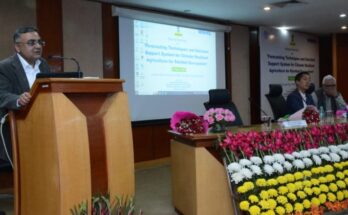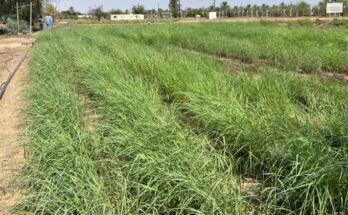Union Budget 2023, to be presented by Union Finance Minister Nirmala Sitharaman, is expected to meet the expectations that would transform the sector which has been supporting the Indian economy enormously. The agriculture sector expects incentives for new technologies and innovations.
As per the government’s data (the Ministry of Statistics and Programme Implementation), the agriculture sector has registered a growth of 3.6 per cent in 2020-21 and 3.9 per cent in 2021-22. The sector has shown tremendous resilience during the Covid-19 crisis and it needs further impetus as robust annual growth is necessary to sustain the momentum. For higher productivity and profitability, the agriculture sector expects rational reforms. It is widely admitted that 2022 was a challenging year for the agriculture and food industry globally with factors such as climate change, supply chain, inflation and geopolitical issues disrupting every economy and triggering a possible global slowdown, apart from the food crisis. The need of the hour is to ensure higher productivity with minimal environmental impact.
You may also like to read – Budget 2023: CropLife India urges Govt to bring GST rate cut in agrochemicals to benefit farmers
Experts, professionals, and senior officials of agriculture and allied sectors have great expectations from the upcoming budget and they have made several recommendations based on ground realities.

“The private sector players are dedicating a significant share of resources and investment in research, promoting sustainable agricultural practices in rural India, and must be incentivised or allowed tax exemptions basis the impact created by their initiatives. In the upcoming Union Budget 2023, it will also be critical to focus on creating an enabling ecosystem, with a faster registration process to introduce newer technologies and molecules for better productivity,” says Ravi Annavarapu, President, FMC India.
“Policies that enable the hassle-free introduction of new global technologies, practices and molecules, while improving the ease of doing business will yield more efficient and sustainable farming practices in India. The availability of support and the speedy access to new-age technologies to farmers will be a game changer in fulfilling India’s aspirations of being a global food supplier while boosting farmer incomes,” recommends Annavarapu.
You may also like to read – Top technology trends that will shape agriculture in 2023
Union Budget 2023 needs to focus on promoting new technologies especially for combating climate change. New technologies can not only increase productivity but also farmers’ profitability. It is also expected that the government would rationalise Minimum Support Price (MSP) policy to promote crop diversification as well.

According to Sanjiv Kanwar, Managing Director, Yara South Asia, the sector would be hoping for a push toward simplifying regulations for the introduction of innovative crop nutrition products, particularly micronutrients and speciality fertilisers. Plant nutrition will be critical to food security in India, given that we may take the title of the most populous country in the world this year. Therefore, we firmly believe that introducing the ‘Plant Nutrition Management Bill’ is necessary and ought to be a top priority for 2023, he adds.
“Soil fertility and micronutrients will be critical to meet the quality requirements for the food being produced in the country. Hence, bringing parity between the taxation on bulk fertilisers and micronutrients will help farmers take advantage of these products to not only improve the quantity, but also the quality of produce. In fact, measures like direct benefit transfers of subsidy amounts into farmers’ bank accounts, will empower them to make a choice of products and services to be used to improve overall productivity for the farm sector. This step will also give wings to the export aspirations of the country,” expounds Kanwar.
You may also like to read – Agriculture needs to get strengthened for being climate-resilient

The sector employs almost half of India’s population, accounting for about 16 per cent of the country’s GDP. It is important to note that the crop protection industry has a vital role to play to take Indian agriculture to new heights. Rajesh Aggarwal, Managing Director, Insecticides India, says “Indian companies have also geared themselves for the new technologies with their R&D initiatives and awareness campaigns in the last few years. There have been a few new interventions like drone technology, where the government has acted fast and taken it to the next level though it is still in the nascent stage. It is expected to help farmers optimise the use of insecticides and increase their efficacy as well.”
The Budget 2023 should look forward to allocating on research and development (R&D) activities to develop new more effective and safer solutions for the control of pests, diseases and weeds for chemical and as well as biological streams. Different forms of incentive to the companies engaged in such R&D activities can be a motivating factor for them to invest more in the same. Moreover, the industry needs more support from the government to maximise the agricultural output in 2023 in the form of incentives like Production Linked Incentives (PLIs).
You may also like to read – Bright prospects of Rabi foodgrain production would offset Kharif losses

Maninder Singh, Founder & CEO, CEF Group, recommends, “The budget should cater to organic, natural farming and urban farming. The government also needs to initiate farmer training programmes, provide ease of licensing for bio-products and must include a provision for the removal of harmful red and blue category chemicals used in agriculture from the entire nation. The focus should also be on revising FCO (Fertilizer Control Order) provision.”

On tax benefits for CapEx / OpEx in technology applications in agriculture, Sandeep Sabharwal, Group Chief Executive Officer, Sohan Lal Commodity Management (SLCM Group), suggests that it is necessary to provide tax incentives to agriculture value-chain players and members of the agriculture fraternity to enhance business operations through the use of technologies in mechanised systems for agricultural value chains and agriculture fraternities.
The industry expects such tax incentives in the upcoming budget to encourage investment in new-age technology applications like Internet of Things (IoT), Artificial Intelligence (AL), Machine Learning (ML), Blockchain and the like. According to him, the government should also consider offering tax benefits to the agri-NBFC sector, as it will help the sector to flourish and will also help the government to achieve its goal of doubling farmers’ incomes.
You may also like to read – Farmers must make the best of ‘farm to home’ concept

Ankit Alok Bagaria, Co-Founder, Loopworm, says, “The upcoming Union Budget 2023 must attempt to positively transform the agriculture and biotechnology sectors in India from a differentiated lens. We would be happy to see more focus and support is given towards supporting the commercialisation of biotechnology companies or startups. We expect the Budget 2023 to make scale-up grants available as well, independent of whether or not any startup has availed a smaller grant previously. Furthermore, the budget should also be promoting precision agriculture and unconventional forms of agriculture such as Algae farming and insect farming with special allocations or incentives.”

With millions of Indians depending on agriculture as the primary source of their livelihood, the sector has always been, especially in the last few years, a key focus of the union budget. This year too, the sector expects the government to support interventions which will enable farmers to sustainably improve their incomes. According to Aneesh Jain, Founder, Gram Unnati, some incentives or schemes for setting up demonstrations will go a great distance in promoting new crops and technology adoption by farmers. These demonstrations should however be conducted in concentrated clusters at a village or gram panchayat level to enable sufficient production in one place otherwise market linkages might become a challenge. “It might also be useful to incentivise the use of modern and innovative crop nutrition solutions. Schemes in this direction will reduce farmers’ dependency on urea and DAP, he suggests.
You may also like to read – Centre and states’ adoption of drone technology brings good news for Indian agriculture
The experts strongly believe that supporting the integration of farmer producer organisations (FPOs) and agritech companies in the agricultural supply chains, Credit Guarantees for Working Capital lines would go long way to encourage the sector. These will enable timely payments to farmers and efficient linkages with markets, especially by FPOs.

Navneet Ravikar, Chairman & Managing Director, Leads Connect Services feels that the universal crop insurance scheme should be launched with a 100 per cent subsidy on premiums for small and marginal farmers with landholding below two hectares. Crop insurance third-party loss assessors association should be formed for technology-based yield estimation and localised claims assessment for timely and equitable claim settlement under Pradhan Mantri Fasal Bima Yojana (PMFBY).
It is also recommended that the grants and subsidies under various schemes for drones should be extended to agritech, agri-fintech, and private research organisations which are working in the field of agriculture. According to the experts, the agritech sector has now been enabling growth. Going forward, it also requires a focus on promotional policy and regulatory framework. The agritech sector is expected to expand if the government focuses on providing and promoting easy access to financing, tax relief, and interest subvention to stimulate agritech startups. They expect that R&D incentives and agricultural digitisation will be given top priority in the future budget. Agritech enterprises, especially startups, surely require a supportive stimulus.





